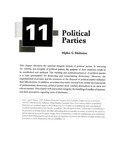Please use this identifier to cite or link to this item:
http://hdl.handle.net/10311/635Full metadata record
| DC Field | Value | Language |
|---|---|---|
| dc.contributor.author | Molomo, M.G. | - |
| dc.date.accessioned | 2010-11-03T15:11:50Z | - |
| dc.date.available | 2010-11-03T15:11:50Z | - |
| dc.date.issued | 2008 | - |
| dc.identifier.citation | Molomo, M.G. (2008) "Political parties,"pp.121-130, In: Maundeni, Z. 2008, Transparency, accountability and corruption in Botswana, Made Plain Communication, Cape Town | en_US |
| dc.identifier.issn | 9780620425704 | - |
| dc.identifier.uri | http://hdl.handle.net/10311/635 | - |
| dc.description.abstract | This chapter discusses the national integrity system of political parties. In assessing the viability and integrity of political parties, the purpose of their existence needs to be established and analysed. The building and institutionalisation of political parties is a basic prerequisite for deepening and consolidating democracy. However, the organisational structures and the resources at the disposal of political parties influence their effectiveness. In addition, as entities that make national laws within the framework of parliamentary democracy, political parties must conduct themselves in an open and ethical manner. This chapter will assess their integrity, the handling of conflict of interest, and their perception regarding rules and disclosure. | en_US |
| dc.language.iso | en | en_US |
| dc.publisher | Made Plain Commucation | en_US |
| dc.rights | Made Plain Communication | en_US |
| dc.subject.lcsh | Political parties | en_US |
| dc.subject.lcsh | Democracy | en_US |
| dc.title | Political parties | en_US |
| dc.type | Book chapter | en_US |
| Appears in Collections: | Research articles (Dept of PAS) | |
Files in This Item:
| File | Description | Size | Format | |
|---|---|---|---|---|
| Molomo_TACB_2008.pdf | Main article | 1.54 MB | Adobe PDF |  View/Open |
Items in DSpace are protected by copyright, with all rights reserved, unless otherwise indicated.
